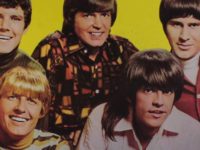Mark Lindsay, coming off a career-making period as frontman for Paul Revere and the Raiders, proceeded to reel off a string of solo hits for Columbia in the early 1970s — only they had little, if anything, in common with the initial fancy-pantsed garage-rock outbursts of his old band. By the time Lindsay bolted, he’d already started moving toward more sophisticated mainstream pop and country rock stylings — best heard on “Indian Reservation,” the Raiders’ final single with Lindsay and only charttopper. Capped by the No. 10 MOR hit “Arizona” (you’re acting like a teenybopper runaway child!), this collection from Real Gone Music traces each of Lindsay’s sooper-smooth solo singles in chronological order — meaning the first five are in period-piece mono, with the others in stereo. Also included is a previously unissued rendition of Tim Hardin’s “Reason to Believe,” originally set for the B-side of Lindsay’s debut 45, along with rare photos and new interviews with Lindsay, producer Jerry Fuller, arranger Artie Butler and backup singer Tom Bahler.
‘Half Notes’ are quick-take thoughts on music from Something Else! Reviews, presented whenever the mood strikes us.
- Nick DeRiso’s Best of 2015 (Rock + Pop): Death Cab for Cutie, Joe Jackson, Toto + Others - January 18, 2016
- Nick DeRiso’s Best of 2015 (Blues, Jazz + R&B): Boz Scaggs, Gavin Harrison, Alabama Shakes - January 10, 2016
- Nick DeRiso’s Best of 2015 (Reissues + Live): John Oates, Led Zeppelin, Yes, Faces + others - January 7, 2016




Of the many hits charted by Paul Revere & the Raiders, the biggest was 1971’s “Indian Reservation.” By contrast, the Nashville Teens was a one-hit wonder band that only broke the Top 20 in 1964 with the hard-edged “Tobacco Road.” The genius behind both these hits is John D. Loudermilk, a prolific singer-songwriter of the 1960s and 70s. Loudermilk was raised in Durham, South Carolina, which informed his songs about Southern poverty and the infamous “Trail of Tears”: the forced removal of the Cherokee Nation from the South to reservations in what is now Oklahoma.